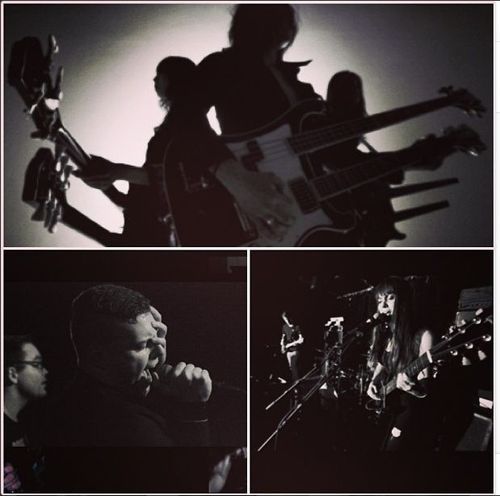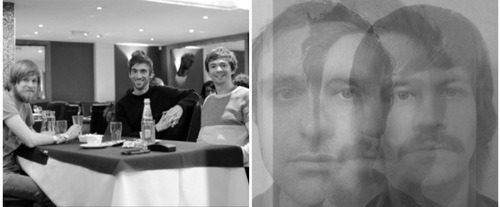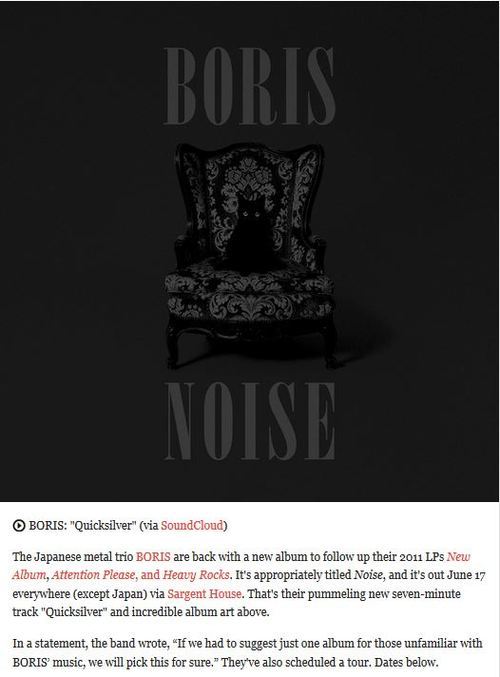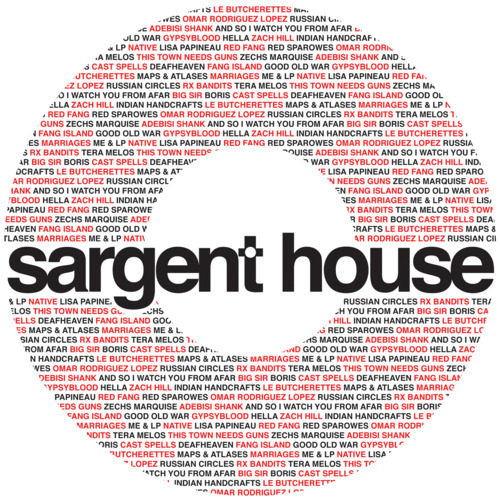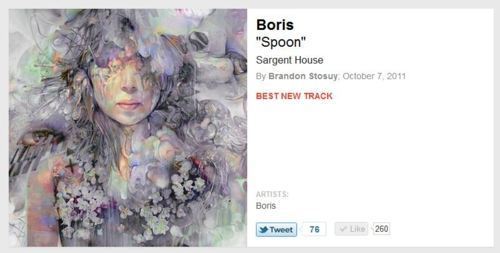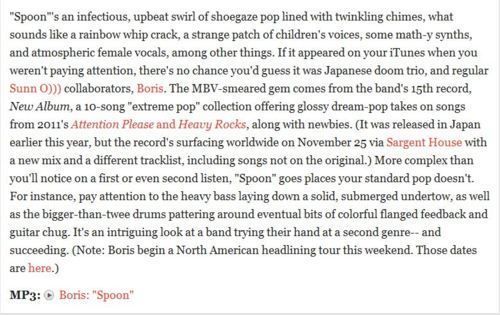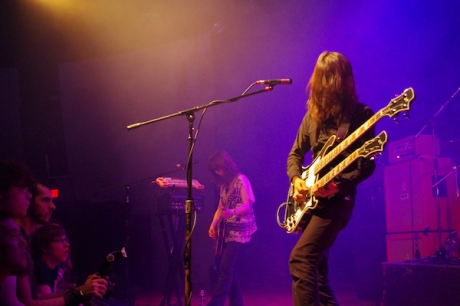Terrorizer Interview: Boris


Boris is currently on tour - Click HERE to see all dates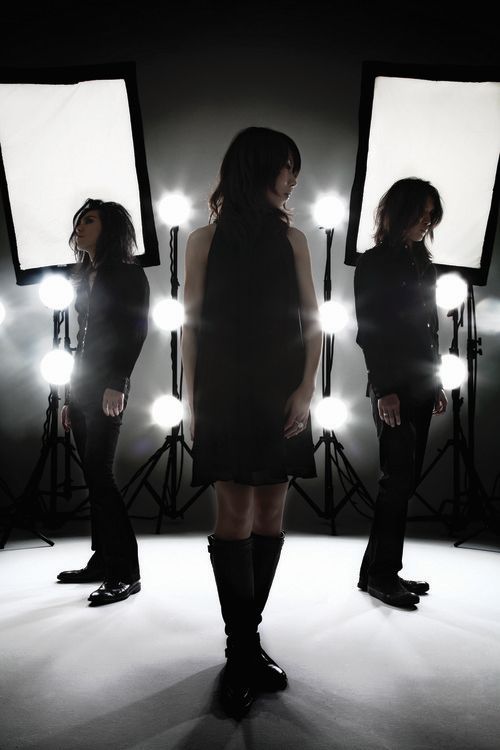
With their new album ‘Noise’, Japanese doom mavericks Boris have managed to combine the melodic, poppy approach of their recent work with the crushing weight of their earlier, heavier material. Jonathan Dick caught up with the band to find out how they did it, and caught a fascinating glimpse into the trio’s creative process…
The fact that Boris take their name from a Melvins song has proved itself to be a more than appropriate connection between two bands whose sound has become as well known for being unpredictable and difficult to categorize as it has for being influential to a number of artists and bands from an incredibly wide range of styles. In their twenty-two years of existence as a band, the Boris sound has mutated from the band’s earliest days with experimental noise to the more pop balanced stylings of their recent releases. Though each of their nineteen releases, including this year’s excellent ‘Noise’, are inherently different from each other with the trio of Atsuo (drums/vocals), Wata (guitar/keyboards/vocals), and Takeshi (bass/guitar/lead vocals) as resistant as ever to anything but change – the band’s central musical theme is still unwaveringly set on loud. It’s a commonality that finds the band again sharing the same aesthetic stage with their namesake who, for all their genre bending, will always be an immovable force in the realm of the loud and the heavy.
What was it that initially attracted you to music? Was there a specific song or band from your youth that worked as that first creative spark for you?
Takeshi (T): “In my childhood I was into theme songs from TV cartoon animation as well as general Japanese pop music TV shows. When I was at junior high school I listened to new wave or techno pop too, then my friend’s brother introduced me heavy metal and punk rock. That was shocking to me like “Oh my god, I didn’t know there is cool stuff like this, I want to be in a band to play that music!” This was the beginning, since then I’ve been absorbed in that kind of music and try to look for harder and faster stuff.”
Atsuo (A): “Same as Takeshi, I was into TV cartoon songs and general Japanese pop music too. My first song that worked as my first creative sparks was “New Rose” by The Damned.”
Wata (W): “I had taken piano lessons ever since I could remember but didn’t like practice at all. Maybe around 12 years old, I saw some band play and thought it looked so fun, especially guitar player looked so cool, that made me feel I wanted to play guitar. Saving money for a guitar, looking for members, practicing… it took a very long time to move forward. At last members and I could make, it was so fun and thrilling.”
Boris has been a band now for over twenty years, and the band’s sound has never truly settled into one place for very long during that time. How have you personally seen the band evolve from a creative standpoint over the years?
T: “Of course we had a particular sound and a certain goal that we have aimed for at one point, though now we are just an epicurean of sound basically, pursuing our ideal and fresh stimulation of sound and music and keep going. Things that we want to achieve are so many and we never catch up, at the same time there are many things that we can’t achieve even though we try to. That’s tardy and a shame to us. However our tardiness can be a kind of our driving force too, because then it leads to lots of music that sounds so weird in general. To look back our history I feel we haven’t changed a bit since before.”
What’s been the most rewarding part of Boris’ journey so far for you? Conversely, what’s been the greatest challenge for the band so far?
T: “Obviously, everyone who supports us. Fans, listeners, all bands that played with, our tour crews, labels, promoters, too many to mention. Since day one of Boris in the ’90s, we have met lots of people and still kept in touch with them, not only that our relationship has been improving and spread even more widely. It is surprising and incredible that there are so many people who support a weird band like us from Japan in the Far East, those people are enabling us to tour, to release new music worldwide, and they are showing us new opportunities to work on. Our accomplishment has been improving day by day.”
Has the eclecticism in sound that’s so singular to Boris ever been a creative point of frustration for the band? That is, with such a multitude of influences and ideas coming into the studio, how does the band focus in on one particular sound or direction, and what does that initial creative process look like for Boris?
T: “We don’t work in a process of the so-called ‘composing’. We just record what we are jamming in studio, sometimes we record an initial rough idea of melody with Voice Memo then we expand it. During the process of expansion of those elements, music will lead us where they would like to go or how they want to be in particular tone and sound. We have never felt a frustration with a song writing process at all. Only if we have to decide which record is the best for that song.”
As the band has aged, have you found yourselves valuing certain aspects of your creative process and working together that you didn’t necessarily recognize or appreciate in the beginning?
T: “Maybe ‘vocal’? In fact I didn’t have any awareness of being a singer at all, nor haven’t I had any specific direct and political/social message in our song since Boris started. However, like what I mentioned above, I have to ‘sing’ more than ‘scream’ in order to shape songs as it should be, because songs require that. Of course I don’t deny what I have been influenced with for years, and you can hear some habit of vocal style and melody to compare with.”
A: “Personally I think Takeshi’s voice fits the current music direction of Boris perfectly. His tasteless/odourless vocal style is something like our advantage.”
‘Noise’ retains a lot of the heavier sounds of early Boris but also has the balance of the more pop-oriented material the band has more recently produced. As Boris is a band that’s just as readily given their creative energy to pop as they have to what’s considered extreme music, do you see pop music as being just as conducive for experimentation as any other genre?
T: “Whatever you think about it, ‘pop’ always appears out of our trial on an unconscious level, both for melody and riffs. Even though we play heavy stuff, it just ‘appears’ unconsciously. Sometimes I’ve felt uncomfortable with it, though I can deal with it naturally now. Well, I am not sure that pop music is conducive for experimentation but that is what we have been influenced by.”
Boris have obviously seen their fanbase greatly increase since 1992. I’m curious to know as music fans, though, what changes you’ve personally observed with regards to experimentation in music over the years. Are listeners more receptive to change now than they were twenty-two years ago, or is the terminology we use to define music simply changing?
A: “Our sound and songs that we have made lead us accordingly and they encourage us to see any changes as a positive thing, which has never changed since our early age. Not only words that define music but also music history is updated day by day. In this situation new music that doesn’t have any context of music history is born actually. We can fit both music with or without context, so our fans are definitely receptive and capable.”
Do you see a great deal of disparity between the audiences of Western culture and those of the Japanese culture?
T: “We do actually, we have a language barrier and a major disparity between the Western world and Japanese culture that we encounter when touring especially. However, we can deal with it better with music as mutual language and common understanding. Due to the Internet things are getting easier ,and I won’t feel any time difference between Western country and here at all. Automatic translation works way better than before too.”
A: “Japan is still in a ‘closed-door policy’. Surrounded by a one-way mirror.”
It often seems that Western culture is hesitant to reward or support its artists and musicians, and I’m curious to know if it’s a similar or quite different situation in Japan.
T: “Well, I am feeling Western countries and culture are way more supportive than Japanese. In general touring operation works much better than Japan has, Western people seem to be more open-minded to art and music.”
W: “I agree, Western countries have a better environment and culture for art and music.”
A: “That’s what I have been thinking.”
You guys have touring plans ahead of you and festival dates as well. What lies ahead for Boris in 2014 and what are you looking forward to the most?
T: “Boris will tour US in July and August, then in Japan in September. We are working on a plan in UK and Europe right now and going to announce it as soon as it confirms. We’ve very much looking forward to seeing you very soon!”
‘Noise’ is available now via Sargent House
You can find Boris on Facebook.






